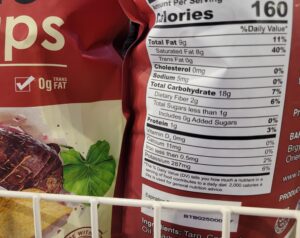Heart expert to consumers: ‘Zero trans fat’ claims can be deceiving
By: Jane Botigan – Cadalig
Never fall for the promise of food with zero trans fat claims.
This is the reminder of Dr. Daryl Derick Dizon, an Internist and Adult Cardiologist, who said consumers should not believe totally in the “zero grams trans fat” labels because these are often done for marketing purposes.
The World Health Organization advocates for the elimination of trans fat in foods, especially those produced industrially because its consumption is linked to an increased risk of heart diseases and death.
A zero grams trans fat label is highly false when it is coming from processed foods, such as cookies and crackers, pizzas, fries, bacons and sausages, burgers, and chips.
Dizon said consumers should not easily fall for the zero gram trans fat claims, adding that labels can lie and hide the bad fats contained in the food.
He said one way to check the veracity of the claim is to look at the list of ingredients, which specifies the components that make up the food product.
“A food product can claim to have zero grams trans fat, but if you look closely at the ingredients and see that it contains partially hydrogenated oil (PHO), it is not healthy,” he said.
PHOs are processed oils that produce trans fats. These are used to ensure a longer shelf life for food products.
To safeguard public health, the World Health Organization is advocating the elimination of industrially produced trans fats, among them the production of PHOs as a food ingredient.
In the Philippines, the Department of Health, through the Food and Drugs Administration Circular 2021-028, implemented a ban on PHO and prepackaged processed foods with trans fat contents that exceed two grams per 100 gram or 100 ml of total fat.
The Circular also prohibits putting “TFA-Free”, “0 g Trans Fat”, or “No transfat”, and similar claims on the label and in the marketing or advertising any processed food.
Dizon said while there are policies prohibiting and encouraging trans fat replacement in food, the biggest challenge remains the availability of processed foods in the market, which are the main sources of trans fats.
“Right now, there is no ban yet on processed foods. Unhealthy food is still widely distributed,” he said, adding access to these has become easier with food deliveries.
To ensure a healthy heart, Dizon suggests for the public to adopt the Philippines Heart Association’s 52100 daily habit which stands for consuming 5 servings of fruits and vegetables, 2 grams of salt or less in a day, having 1 hour of exercise, consuming 0 sugary beverage, and practicing 0 smoking.
Dizon is one of the resource persons in the recent Food Health and Nutrition webinar series organized by the CAR Media Educators on Nutrition in partnership with the National Nutrition Council-Cordillera. – JANE BOTIGAN-CADALIG



